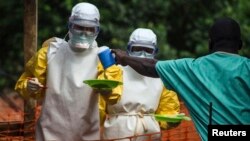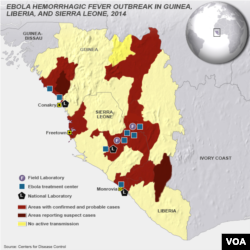The Ebola outbreak that began in Guinea a few months ago has spread to Liberia and Sierra Leone. The World Health Organization now reports more than 700 deaths in the region. In this country, more than 230 have died and more than that are in quarantine and undergoing treatment.
There is no known vaccine or cure, so past medical experience was to isolate the patients so the virus did not spread. Unlike previous outbreaks, this 2014 outbreak has not subsided.
In declaring a public health emergency this week, President Ernest Bai Koroma of Sierra Leone ordered that all Ebola patients quarantined at home. He vowed house-to-house searches for those exposed after families refused treatment at isolation centers.
Stepping up the fight against Ebola in Kailahun
Health care specialists and key stakeholders in Sierra Leone have stepped up the fight against Ebola. Already, suspected cases have been reported in the capital, Freetown, and other provincial towns. Until recently, outbreaks occurred in rural areas.
The first case of Ebola was reported in Kailahun District – a frontline in the Ebola virus battle - on May 25, after a nurse came into contact with an Ebola carrier and died. Since then, the death toll has been steadily increasing especially in the eastern districts of Kailahun and Kenema. Medecins sans Frontieres (MSF) operates a treatment center here.
Medical experts say the symptoms of the Ebola virus are fever, throat and muscle pains, and headaches that lead to nausea, vomiting, diarrhea, and decreased functioning of the liver and kidneys. At this point, some victims begin to have problems with bleeding.
How the virus grows
The disease may spread within a population through contact with the blood or bodily fluids of others, or from an infected animal such as a fruit bat or monkey. Once infection occurs, the virus may be spread from one person to another. That includes touching or washing the body of an Ebola victim. Caregivers may come into contact with diarrhea, vomit, semen and blood from an infected family member.
Scientists also warn against eating wildlife that could carry Ebola, including monkeys, chimpanzees, wild antelope, fruit bats and other bush meat.
In the last two months, health workers have mounted a crusade against Ebola through radio broadcasts, street shows, workshops, and community outreach. The effort aims to educate the public about the spread of the virus and to explain how the use of a disinfectant like chlorine, soaps and detergents can kill it on common surfaces.
The campaign is supported by U.N. agencies, the International Rescue Committee, the non-government health from Ireland – Goal - government and other donors.
Police assist in the quarantine
A police source says 70 police personnel have been deployed at various entry points in the district of Kailahun and Kenema to allow health workers to screen passengers coming from Ebola-affected communities. The rationale is to restrict the movement of people and prevent the spread of the disease. People with have high fevers are further tested for malaria and typhoid. Those suspected of having Ebola are quarantined.
“For now, we offer palliative treatment to manage the Ebola fever,” says Finda Josephine Saidu, deputy matron at the Kenema Government Hospital where four doctors direct the care of the Ebola victims. “Basically, we are managing the cases since there are no specific treatments. We replace the fluids lost through vomiting, and use drugs to control the bleeding.”
Josephine Saidu talked about the devastating numbers of victims the virus has attacked, especially on health workers at the management unit.
“For Kenema District, 13 nurses have died. Six are current being cared for at the Ebola management center.”
Nurses here are putting their lives on the line to save the country from the epidemic. They urge the public to help by reporting suspected cases to the hospital as soon as possible. Time is crucial. Saidu said the ebola is real and can be prevented if reported early.
Nurses suffer discrimination from frightened public
In a recent briefing about the creation of an Ebola task force, the mayor of Kenema City Council, Joseph Keifala, said the fight against Ebola must be localized.
“Councilors and ward committee members should be seen championing the fight against Ebola at ward level,” said the mayor. “They will support the surveillance team, report suspected ebola cases to the center, promote the use of chlorine and compliment the efforts of the social mobilization team.”
Keifala urged the public to cooperate with health workers in surveillance and control. He asked people not to discriminate against disease survivors and nurses working at the Ebola management unit.
“This may be a challenge. Health workers say there are a lot of misconceptions about ebola. A few weeks ago, the police arrested a man who allegedly assaulted a nurse, accusing her of having the illness. Some believe nurses carry the disease or inject the illness into people.
“Cases have been reported of suspected ebola carriers refusing to get into ambulances, and of families abandoning corpses so health workers cannot follow them.”
Health workers say the fight against Ebola in Sierra Leone will continue until the disease finally dies out.
The religious community believes that the fight against Ebola needs a spiritual approach. Special prayers are now being offered in mosques and churches.






